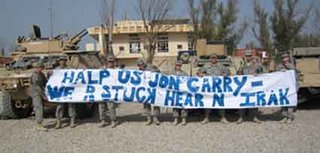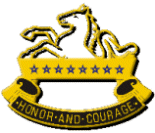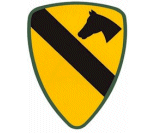DISPATCH 008--21 NOV 2006
“Joseph said to them, ‘Do not be afraid, for am I in the place of God? 20 But as for you, you meant evil against me; but God meant it for good, in order to bring it about as it is this day, to save many people alive. Now therefore, do not be afraid; I will provide for you and your little ones.’ And he comforted them and spoke kindly to them.”Genesis 50:19-21
Joseph wrote these words in response to his older brothers who were concerned for their safety and the safety of their children. They had reason to be afraid. Joseph had been rather bold as a youth, even to the point of sharing with his brothers the dreams he had about his family. In these dreams, it was apparent that Joseph one day would be the most powerful and influential of them all. Well, as you can imagine, this did not sit too well with his ten older siblings. One day, after traveling a great distance, Joseph met them in the fields where they were tending to their father Jacob’s flocks. Evil got the better of the older brothers, and after deciding against murdering Joseph, they instead sold him into slavery.
Thus began an interesting chain of events for the brash young man. Once he his father’s favorite, he now found himself traveling in a caravan on his way to the slave markets in Egypt. Sold to an important member of the king’s, or Pharaoh’s, staff, Joseph grew in stature until his boss’s wife made a pass at him that he refused. The spurned woman turned on Joseph and accused him of attacking her. Betrayed once again, Joseph found himself thrown in prison, probably thankful for his life, and hanging out with Pharaoh’s chief baker and butler, who were in trouble with the king. One thing led to another, and because of Joseph’s ability to interpret dreams, he found himself placed before Pharaoh to explain the king’s dreams. Giving all the credit to God, Joseph correctly interpreted the dreams; and, impressed by the youth’s connection with God, Pharaoh made him his second in command, placing him in charge of the collection of surplus crops in order to prepare for the coming famine, the famine Joseph correctly predicted from the dreams.
Meanwhile, Joseph’s very guilty brothers had returned to their father. They lied to him and told him that a wild animal attacked his son. Heartbroken and inconsolable, their father was never the same. When famine gripped the land, they traveled to Egypt, for they heard that the wise Pharaoh had stored food to sell. When they met Joseph again, they did not recognize their brother, but he recognized them. Now was an interesting time in the history of Israel, in the history of the world. Would Joseph seek revenge, or would he seek mercy?
As we read from the above passage, after testing his brothers, Joseph granted mercy and did not seek vengeance. Vengeance, like all lies, entices those who seek her with the promise of satisfaction and justice. Lies are just the truth slightly twisted, and this lie is no different. Retribution is a self-breeding vice, a journey down a path that never ends. As soldiers, we have seen the effects of vengeance and its wicked offspring of mistrust, hatred, and bitterness. As soldiers, we are facing the giant task of teaching in both word and deed that the way things in Iraq have been done in the past is not the way it has to be.
One of the most important qualities of our nation’s soldiers, your family members, is that they day after day still bring a sense of hope to their vocation: hope for themselves and the Iraqi people. To be sure, we have cynics in our ranks, but, for the most part, the vast majority of us hopes and secretly prays that our attempt to sow peace will take root and grow.
I spoke with soldiers at Patrol Base (PB) O’Ryan, and they shared with me how impressed they were with their Iraqi Army counterparts. They told me of the Iraqis' desire to learn and to execute their mission to do the dangerous and important work to keep their country safe. Our soldiers had seen their Iraqi neighbors weep for joy when they heard that Saddam was convicted of his genocidal war crimes. The tears were not for vengeance, but shed in hopes that, in the words of one of the Iraqi soldiers, “my children will one day play on the streets of my hometown, play without fear, just as I did thirty years ago as a young boy.”
We have heard many voices openly questioning our resolve and our need to stay in Iraq. Our military families, with the numerous deployments to our war zones, have paid a high price for the service their family members render. With all the negative things we hear, it would be easy to lose hope not only for the future but to become jaded about what we have already done.
I have heard many times and have come to believe that the way we see the world is only a reflection of our own values. If we are constantly plotting on how to get ahead and scheming against others, then we will see the world as an untrustworthy, unhappy place. I asked some of our soldiers how they see the world around them, here, in Iraq. Do we see it through the eyes of those who have called our sacrifice in vain, or do we see it through the eyes of Joseph, a man who despite all the evil that had been done to him, despite the numerous reasons he had to doubt and disbelieve, still saw God’s hand and mercy working in and through the very people who had betrayed him?
Permit me to share with you a true story about another man who had every reason to seek vengeance and to grow weary and cynical about the world around him. As a boy of 7 years, his family was forced out of their home, and he went to work. When he was 9, his mother died. He lost his job as a store clerk when he was 20. He wanted to go to law school, but he didn't have the education. At age 23 he went into debt to be a partner in a small store. Three years later the business partner died, and the resulting debt took years to repay.
When he was 28, after courting a girl for four years, he asked her to marry him, and she turned him down. On his third try he was elected to Congress, at age 37, but then failed to be re-elected. His son died at 4 years of age. When this man was 45, he ran for the Senate and lost. At age 47 he ran for the vice-presidency and lost. But at age 51 he was elected president of the United States.
The man was Abraham Lincoln, a man who learned to face discouragement and move beyond it. Did you know that it was Abraham Lincoln who, in the midst of the Civil War, in 1863, established the annual celebration of Thanksgiving? Lincoln had learned how important it is to stop and thank God in the midst of great difficulties.
What do we have to be thankful for on this day?
I will close with this thought. I asked our soldiers, I ask myself every day, do we look for God in this place? Well, I would like to turn this question around. How does God see us, this world, Ft. Hood, or Iraq?
Perhaps we can find the answer in the first Sunday after Thanksgiving. It begins the Christian season of Advent, meaning arrival. God saw the world and came as a child, a child without power, importance, or wealth. As a child He, too, would flee to Egypt with those in power already beginning to seek His life. God then, and now, did not and has not lost hope for this world, even though we at times might. He still sees those war-torn areas, where there is every reason to despair, and He still comes.
Because of faith, we still have reason to hope. Because of His promises, we do not have to despair. And even in this place, with towns like Balad, Ad Dujayl, Baghdad, and Mosul, we can still see that, while some might have given up hope for the future, He still is coming, working, seeking to sow peace.
Our prayers, thoughts, and dreams are with and go with you.
Gratia et Veritas,
Chaplain Kevin Wainwright





